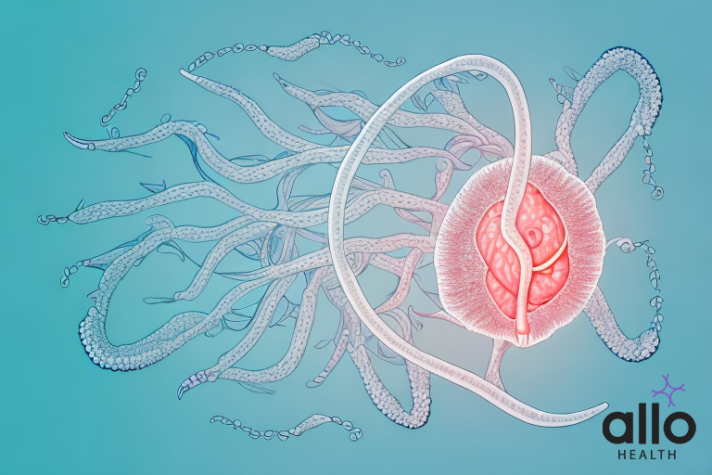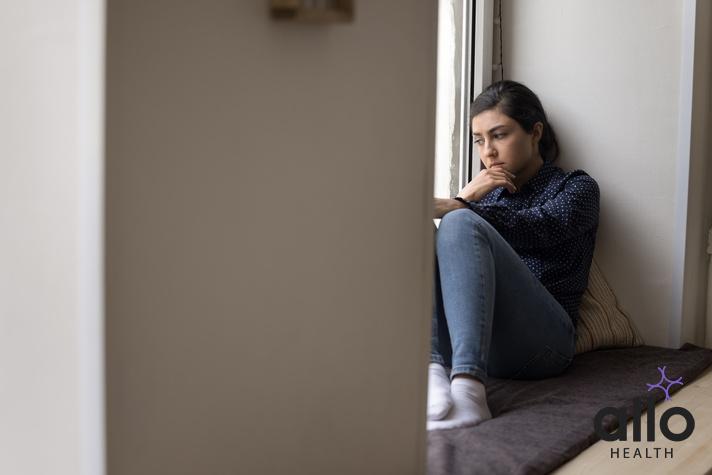Understanding Vaginal Itching After Your Period

Allo Health is dedicated to personalized well-being, offering support and trusted information tailored to individual health goals. The platform emphasizes human-generated content, led by a distinguished medical team of experts, including physicians and sexual health specialists. Their commitment to credibility involves rigorous fact-checking, authoritative research, and continuous updates to ensure accurate, up-to-date information. Allo Health's unique approach goes beyond conventional platforms, providing expert-led insights and a continuous commitment to excellence, with user feedback playing a crucial role in shaping the platform's authoritative voice.

Dr. Raj. R holds an undergraduate medical degree from the Philippines, and has a bachelors background in Psychology. His experience working in the field of urology further brought his interest forward in working towards his passion of understanding the science of attraction, intimacy, sex and relationships. A key motto he practices by remains unprejudiced and non-judgemental care.
Why This Was Upated?
Our experts continually monitor the health and wellness space, and we update our articles when new information became available.
Updated on 16 February, 2024
- Article was updated as part of our commitment to diversity, equity, and inclusion.

"The following blog article provides general information and insights on various topics. However, it is important to note that the information presented is not intended as professional advice in any specific field or area. The content of this blog is for general educational and informational purposes only.
Book consultation
The content should not be interpreted as endorsement, recommendation, or guarantee of any product, service, or information mentioned. Readers are solely responsible for the decisions and actions they take based on the information provided in this blog. It is essential to exercise individual judgment, critical thinking, and personal responsibility when applying or implementing any information or suggestions discussed in the blog."
As a woman, you are no stranger to vaginal itching. It can be uncomfortable, irritating, and downright frustrating. But, when vaginal itching occurs after your period, it can be even more confusing and concerning. In this article, we will provide a comprehensive guide to understanding this post-period itching, what causes it, and how to alleviate and prevent future episodes.
Vaginal Itching Causes
Vaginal itching can have various causes, and it’s important to identify the underlying factor to determine the appropriate treatment. Here are some detailed explanations of common causes of vaginal itching:
- Yeast Infections (Candidiasis):
- Cause: Overgrowth of the fungus Candida, particularly Candida albicans, in the vagina.
- Risk Factors: Antibiotic use, pregnancy, diabetes, weakened immune system, hormonal fluctuations, and use of oral contraceptives.
- Symptoms: Itching, burning, redness, swelling, and a thick, white, cottage cheese-like discharge.
- Bacterial Vaginosis (BV):
- Cause: Imbalance in the normal bacteria in the vagina, with an overgrowth of harmful bacteria.
- Risk Factors: Multiple sexual partners, douching, smoking, and the use of intrauterine devices (IUDs).
- Symptoms: Itching, along with a fishy-smelling discharge that may be gray or white.
- Trichomoniasis:
- Cause: A sexually transmitted infection (STI) caused by the parasite Trichomonas vaginalis.
- Risk Factors: Unprotected sexual intercourse with an infected partner.
- Symptoms: Itching, redness, irritation, frothy, yellow-green vaginal discharge, and discomfort during urination or sex.
- Sexually Transmitted Infections (STIs):
- Cause: Various bacteria, viruses, or parasites transmitted through sexual contact.
- Risk Factors: Unprotected sexual activity with an infected partner.
- Symptoms: In addition to itching, other symptoms may include pain during urination, unusual discharge, sores, or rashes.
- Irritants:
- Cause: Exposure to substances that irritate the sensitive genital area, such as perfumed soaps, bubble baths, douches, or synthetic underwear.
- Risk Factors: Use of irritating personal hygiene products.
- Symptoms: Itching, redness, and irritation.
- Hormonal Changes:
- Cause: Fluctuations in hormonal levels during pregnancy, menopause, or the menstrual cycle.
- Risk Factors: Pregnancy, menopause, use of hormonal contraceptives.
- Symptoms: Itching and discomfort associated with hormonal changes.
- Skin Conditions:
- Cause: Dermatological conditions affecting the skin around the genital area, such as dermatitis or psoriasis.
- Risk Factors: Personal or family history of skin conditions.
- Symptoms: Itching, redness, and skin changes.
It’s important to note that these are general explanations, and individual cases may vary. If you are experiencing persistent or severe vaginal itching, it is crucial to seek medical advice for a proper diagnosis and tailored treatment plan. Self-diagnosis and treatment without professional guidance may lead to complications or ineffective management of the underlying cause.

Vaginal Itching Treatment
The treatment for vaginal itching depends on the underlying cause. It is important to consult with a healthcare professional for an accurate diagnosis and appropriate treatment. Below are some general approaches to treating common causes of vaginal itching:
- Yeast Infections (Candidiasis):
- Treatment: Antifungal medications, such as over-the-counter creams or prescription oral medications, are commonly used. Examples include clotrimazole, miconazole, or fluconazole.
- Bacterial Vaginosis (BV):
- Treatment: Antibiotics, such as metronidazole or clindamycin, are prescribed to restore the balance of bacteria in the vagina. It is important to complete the full course of antibiotics even if symptoms improve.
- Trichomoniasis:
- Treatment: Antimicrobial medications, usually metronidazole or tinidazole, are prescribed to eliminate the Trichomonas parasite. Both sexual partners should be treated simultaneously to prevent re-infection.
- Sexually Transmitted Infections (STIs):
- Treatment: Specific medications are prescribed based on the type of STI. For example, herpes may be treated with antiviral medications, while bacterial STIs like chlamydia and gonorrhea may be treated with antibiotics.
- Irritants:
- Treatment: Identify and avoid potential irritants, such as perfumed soaps or harsh detergents. Use mild, unscented soaps and wear breathable cotton underwear. Symptomatic relief can be achieved with over-the-counter creams or ointments that soothe irritation.
- Hormonal Changes:
- Treatment: If hormonal changes are contributing to vaginal dryness and itching, topical estrogen therapy may be prescribed. This can help restore the vaginal tissue and alleviate symptoms.
- Skin Conditions:
- Treatment: Dermatological conditions may require specific treatments, such as corticosteroid creams for inflammation associated with dermatitis or psoriasis. A dermatologist can provide a tailored treatment plan.
In addition to specific treatments for the underlying cause, general self-care measures can help manage symptoms and promote vaginal health:
- Avoid douching, as it can disrupt the natural balance of the vagina.
- Wear breathable cotton underwear and avoid tight-fitting clothing.
- Practice good hygiene, but avoid using harsh soaps or scented products on the genital area.
- Stay well-hydrated and maintain a healthy diet.
- Practice safe sex by using condoms to prevent STIs.
It is crucial to follow healthcare provider recommendations and complete the full course of prescribed medications. If symptoms persist or worsen, or if new symptoms arise, it is important to seek prompt medical attention for further evaluation and adjustments to the treatment plan.
Understanding Vaginal Itching After Your Period
Vaginal itching after your period can have various causes, and it’s essential to consider factors related to the menstrual cycle, hygiene practices, and potential infections. Here’s a detailed exploration of some common reasons for experiencing vaginal itching after menstruation:
- Residual Menstrual Products:
- Cause: Sometimes, traces of menstrual blood or residual products (tampons, pads) may remain in the vagina after the period ends.
- Effect: This can create a breeding ground for bacteria, potentially leading to irritation and itching.
- Prevention/Treatment: Ensure proper hygiene by changing tampons or pads regularly. Consider using unscented, hypoallergenic menstrual products.
- Hormonal Fluctuations:
- Cause: Hormonal changes during the menstrual cycle, especially in the post-menstrual phase, can affect the vaginal environment.
- Effect: A drop in estrogen levels after menstruation may contribute to vaginal dryness, making the area more susceptible to irritation.
- Prevention/Treatment: Consider using water-based lubricants if dryness is an concern. If hormonal changes are significant, hormonal therapies may be discussed with a healthcare provider.
- Yeast Infections:
- Cause: The post-menstrual phase can create conditions conducive to yeast overgrowth due to changes in pH and hormonal fluctuations.
- Effect: Yeast infections may cause itching, redness, and a cottage cheese-like discharge.
- Prevention/Treatment: Practice good hygiene, wear breathable underwear, and consider using probiotics. Antifungal medications can be used to treat yeast infections.
- Bacterial Vaginosis (BV):
- Cause: Hormonal fluctuations and changes in pH levels can contribute to the development of BV.
- Effect: BV may cause itching, along with a fishy-smelling discharge.
- Prevention/Treatment: Maintain good hygiene practices, avoid douching, and seek medical attention for antibiotics if diagnosed with BV.
- Allergic Reactions:
- Cause: Exposure to allergens in personal hygiene products or clothing materials.
- Effect: Allergic reactions can lead to itching and irritation.
- Prevention/Treatment: Identify and avoid potential allergens. Use hypoallergenic, fragrance-free products.
- Dryness and Friction:
- Cause: Reduced lubrication after menstruation, especially if the flow was heavy.
- Effect: Friction during sexual activity or daily movements can cause irritation.
- Prevention/Treatment: Use water-based lubricants if needed. Consider the use of breathable cotton underwear and loose-fitting clothing.
If you experience persistent or severe vaginal itching after your period, it’s crucial to consult with a healthcare professional for an accurate diagnosis and appropriate treatment. They can help identify the specific cause and recommend targeted interventions to alleviate symptoms and prevent recurrence. Avoid self-diagnosis and over-the-counter treatments without professional guidance, as they may not address the underlying concern effectively.
Most Asked Questions
-
Why do I experience vaginal itching after my period?
Vaginal itching post-period can be attributed to various factors. Hormonal fluctuations, residual menstrual products, and changes in pH levels create an environment conducive to irritation. It could also result from dryness due to reduced lubrication after menstruation.
-
Is post-period itching a sign of a yeast infection?
Yes, hormonal fluctuations during the menstrual cycle can contribute to yeast overgrowth, leading to infections. Symptoms include itching, redness, and a cottage cheese-like discharge. Antifungal medications are typically used for treatment.
-
What steps can I take to prevent and alleviate post-period itching?
Maintain good hygiene by changing menstrual products regularly, avoid douching, and wear breathable underwear. If dryness is an concern, use water-based lubricants. Identify potential allergens in personal care products and opt for hypoallergenic options to prevent allergic reactions. If symptoms persist, consult a healthcare professional for an accurate diagnosis and targeted treatment.
-
How can hormonal changes contribute to post-period itching?
Hormonal shifts, particularly a decrease in estrogen levels after menstruation, may lead to vaginal dryness. This dryness can make the vaginal area more susceptible to irritation and itching. Using water-based lubricants may help alleviate discomfort.
-
Can residual menstrual products cause itching after my period?
Yes, traces of menstrual blood or leftover tampons/pads can linger in the vagina after the period ends. This creates a breeding ground for bacteria, potentially causing irritation and itching. Regularly changing menstrual products and practicing good hygiene can prevent this.






































